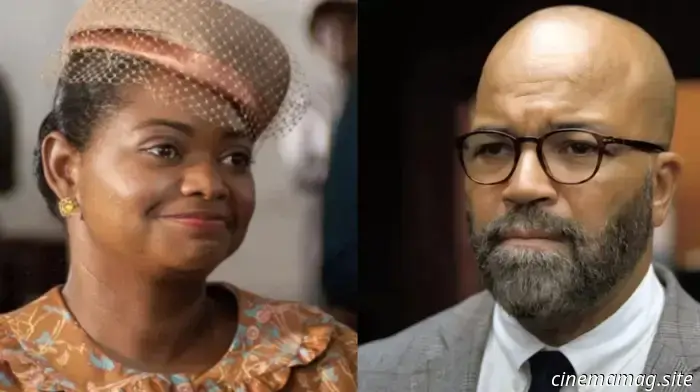
Lurker Review: A Psychological Thriller Featuring a Cat-and-Mouse Dynamic Lacking Impact
If your psychological thriller revolves around a man fixated on a pop star on the brink of fame, the music must be convincing and the artist sufficiently charismatic to justify this obsession. The most glaring shortcoming of Lurker, the directorial debut of Alex Russell (writer for shows like The Bear and Beef), is how it treats the music of its pop star, Oliver (Archie Madekwe), as an afterthought. The sound is so out of touch with contemporary trends that it’s hard to believe he’s on the verge of a breakthrough or that anyone would be this invested in him. I admit I become particularly critical when watching films about pop music that fail to capture the essence of their respective eras. For instance, I've never appreciated Brady Corbet’s Vox Lux, where the music resembles Sia-influenced electro-pop from the mid-2010s rather than the bubblegum pop typical of its early 2000s backdrop. Conversely, Lurker suffers from the opposite issue: Oliver’s music feels outdated by about a decade, closely resembling the late-2010s R&B sound of Khalid, whose broad, anthemic songs about American youth lacked lasting appeal beyond the pre-COVID era.
The film occasionally tries to depict Oliver’s artistic sensibilities as shallow—evidenced by the tacky decor in his bedroom and the way he reduces his various influences to a generic, confessional bedroom pop that contradicts those inspirations. However, critiquing his superficiality feels at odds with a story about someone dangerously obsessed with him, even though Matthew (Théodore Pellerin), a clothing-store employee who's taking advantage of Oliver's naivety, finds a way in by quickly playing a Nile Rodgers track when Oliver visits the store. Oliver is currently creating music influenced by Matthew and wants him to come to his show later that night for feedback. Despite lacking critical thinking skills or charisma and with Oliver's entourage appearing generally disinterested, Matthew somehow ingratiates himself into the inner circle, tasked with filming a behind-the-scenes documentary of an emerging star. What follows is a cat-and-mouse dynamic, where it’s unclear who’s manipulating whom, with power shifts within their relationship. Still, given that one of them is an obvious social climber, it becomes evident, even when the situation doesn't favor him.
Similar to Saltburn, which also featured Madekwe, Lurker could be dubbed “The Untalented Mr. Ripley” due to how devoid of personality its main character is. While it’s easy to see how he’s exploiting situations for his benefit, it’s less understandable why he keeps getting invited back into the inner circle after each social misstep reveals him as a shameless opportunist. This undermines the film's credibility as a thriller, stretching believability in finding new ways for Matthew to return to the fold, and it doesn’t effectively critique the emptiness of modern fame. It’s never entirely clear how famous Oliver is meant to be; he’s pursued by fans on the streets, resides in a lavish mansion in L.A., and everyone around him (including Matthew) gains tens of thousands of Instagram followers just from being associated with him. Yet, he performs in small clubs, and his music sounds outdated compared to what has dominated the charts for several years. If Oliver had been portrayed as a wealthy nepo baby, a second-generation industry figure waiting to be launched into the public eye, these inconsistencies would be more understandable and would add depth to the satire. Instead, we only discover that he abandoned his surname presumably due to estrangement from his family and is now in a position to choose his own identity, creating a tight-knit group from his various followers.
Oliver is influenced by subtle flattery; Matthew hints at greatness in his music without ever making direct comparisons, allowing Oliver to fill in the gaps himself. This manipulation tactic positions Matthew as somewhat detached rather than an eager fan seeking validation from someone likely to overlook him when he’s not being praised or utilized, but this only highlights Matthew’s own fandom issue. Before Oliver enters his life, he shows little sign of obsession or even interest in the singer, yet he’s knowledgeable enough to recognize that Oliver is making music inspired by Nile Rodgers. If he’s secretly a celebrity-obsessed opportunist, why does he exhibit so few signs of genuine interest? Setting the film in Los Angeles might serve as shorthand for some viewers to understand that this is a city brimming with individuals seeking industry connections for a big break, but Lurker relies too heavily on this context without delving into its lead's psychology more profoundly. Even by the film’s conclusion, despite witnessing all the schemes Matthew devises to remain in Oliver's world, I never saw him as someone with a genuine artistic interest to share with the world.
On a more surface level, there’s not even a tangible sexual obsession between the two main characters. Each time Russell hints at this—
Other articles
-Movie-Review.jpg) Relay (2025) - Film Review
Relay, 2025. Directed by David Mackenzie. Featuring Riz Ahmed, Lily James, Sam Worthington, Willa Fitzgerald, Jared Abrahamson, Pun Bandhu, Eisa Davis, Matthew Maher, Seth Barrish, Victor Garber, Reed Northrup, Aaron Roman Weiner, and Jessica Garza. SYNOPSIS: A facilitator of profitable negotiations between dishonest corporations and the people who endanger them violates his own principles when […]
Relay (2025) - Film Review
Relay, 2025. Directed by David Mackenzie. Featuring Riz Ahmed, Lily James, Sam Worthington, Willa Fitzgerald, Jared Abrahamson, Pun Bandhu, Eisa Davis, Matthew Maher, Seth Barrish, Victor Garber, Reed Northrup, Aaron Roman Weiner, and Jessica Garza. SYNOPSIS: A facilitator of profitable negotiations between dishonest corporations and the people who endanger them violates his own principles when […]
 The Conjuring: Last Rites reveals a chilling new trailer.
As tickets are now available for The Conjuring: Last Rites, set to premiere in just two weeks, Warner Bros. has unveiled a chilling new trailer for the latest addition to the horror franchise. This installment features Ed and Lorraine assisting the Smurl family in confronting the malevolent entity that haunts them.
The Conjuring: Last Rites reveals a chilling new trailer.
As tickets are now available for The Conjuring: Last Rites, set to premiere in just two weeks, Warner Bros. has unveiled a chilling new trailer for the latest addition to the horror franchise. This installment features Ed and Lorraine assisting the Smurl family in confronting the malevolent entity that haunts them.
 Super Troopers 3 is in development by Broken Lizard.
Super Troopers 3 is officially in the pipeline, with Jay Chandrasekhar set to direct and reprise his role as Thorny. He will be joined once more by his longtime colleagues Kevin Heffernan (Farva), Steve Lemme (Mac), Paul Soter (Foster), and Erik Stolhanske (Rabbit). Returning as well are Brian Cox as Captain John O’Hagan and Marisa Coughlan as [...]
Super Troopers 3 is in development by Broken Lizard.
Super Troopers 3 is officially in the pipeline, with Jay Chandrasekhar set to direct and reprise his role as Thorny. He will be joined once more by his longtime colleagues Kevin Heffernan (Farva), Steve Lemme (Mac), Paul Soter (Foster), and Erik Stolhanske (Rabbit). Returning as well are Brian Cox as Captain John O’Hagan and Marisa Coughlan as [...]
 Jeffrey Wright and Octavia Spencer set to appear in Death of a Salesman.
Chinonye Chukwu and Tony Kushner's film adaptation of Death of a Salesman has secured its leading roles, with Deadline announcing that Jeffrey Wright and Octavia Spencer will headline the project from Focus Features and Amblin. Death of a Salesman, a poignant play by Arthur Miller, was penned in 1949 and delves into the […]
Jeffrey Wright and Octavia Spencer set to appear in Death of a Salesman.
Chinonye Chukwu and Tony Kushner's film adaptation of Death of a Salesman has secured its leading roles, with Deadline announcing that Jeffrey Wright and Octavia Spencer will headline the project from Focus Features and Amblin. Death of a Salesman, a poignant play by Arthur Miller, was penned in 1949 and delves into the […]
Lurker Review: A Psychological Thriller Featuring a Cat-and-Mouse Dynamic Lacking Impact
If your psychological thriller focuses on a man fixated on a pop star nearing superstardom, then the music must be convincing enough, and the musician must be charismatic enough, to make this artist a plausible object of obsession. The most apparent shortcoming of Lurker, the directorial debut of Alex Russell (writer...
